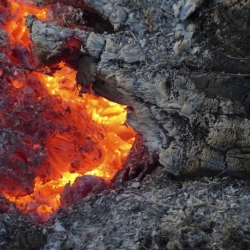| Source (Hebrew) | Translation (English) |
|---|---|
הַ֥לְלוּ יָ֨הּ ׀ הַֽלְל֣וּ אֶת־יְ֭הוָה מִן־הַשָּׁמַ֑יִם |
Hallelu-Yah! Applaud and cheer Yah, From the heavens. |
הַֽ֝לְל֗וּהוּ בַּמְּרוֹמִֽים׃ הַֽלְל֥וּהוּ כָל־מַלְאָכָ֑יו הַֽ֝לְל֗וּהוּ כָּל־צבאו [צְבָאָֽיו׃] הַֽ֭לְלוּהוּ שֶׁ֣מֶשׁ וְיָרֵ֑חַ הַ֝לְל֗וּהוּ כָּל־כּ֥וֹכְבֵי אֽוֹר׃ הַֽ֭לְלוּהוּ שְׁמֵ֣י הַשָּׁמָ֑יִם וְ֝הַמַּ֗יִם אֲשֶׁ֤ר ׀ מֵעַ֬ל הַשָּׁמָֽיִם׃ יְֽ֭הַֽלְלוּ אֶת־שֵׁ֣ם יְהוָ֑ה כִּ֤י ה֭וּא צִוָּ֣ה וְנִבְרָֽאוּ׃ וַיַּעֲמִידֵ֣ם לָעַ֣ד לְעוֹלָ֑ם חָק־נָ֝תַ֗ן וְלֹ֣א יַעֲבֽוֹר׃ הַֽלְל֣וּ אֶת־יְ֭הוָה מִן־הָאָ֑רֶץ תַּ֝נִּינִ֗ים וְכָל־תְּהֹמֽוֹת׃ אֵ֣שׁ וּ֭בָרָד שֶׁ֣לֶג וְקִיט֑וֹר ר֥וּחַ סְ֝עָרָ֗ה עֹשָׂ֥ה דְבָרֽוֹ׃ הֶהָרִ֥ים וְכָל־גְּבָע֑וֹת עֵ֥ץ פְּ֝רִ֗י וְכָל־אֲרָזִֽים׃ הַֽחַיָּ֥ה וְכָל־בְּהֵמָ֑ה רֶ֝֗מֶשׂ וְצִפּ֥וֹר כָּנָֽף׃ מַלְכֵי־אֶ֭רֶץ וְכָל־לְאֻמִּ֑ים שָׂ֝רִ֗ים וְכָל־שֹׁ֥פְטֵי אָֽרֶץ׃ |
Praise him, the most sublime! Angel assembly, sing Hallel! Heaven hosts, sing Hallel!! Hallel!, too, sun and moon. Hallel!, also, stars of light! Jubilation From the heavens of heavens. From the streams of endless space, He has decreed your existence. Praise God and be grateful for life. He fortified you to last long; Set a directive, That cannot be disobeyed. Hallel!, too, from earth, From dragons and deep canyons. Fire, hail, snow and fog, Tempests and storms Obeying his word. Mountains, Hallel!! And hills echo. Fruit trees and cedars Sway their praise. Wild and tame creatures, Creepers and winged birds. Hallel!, too, from you – Rulers of lands and nations, Officials and judges of the land. |
בַּחוּרִ֥ים וְגַם־בְּתוּל֑וֹת זְ֝קֵנִ֗ים עִם־נְעָרִֽים׃ |
Lads and also lasses, Hallel!! Elders together with youths. |
יְהַלְל֤וּ ׀ אֶת־שֵׁ֬ם יְהוָ֗ה כִּֽי־נִשְׂגָּ֣ב שְׁמ֣וֹ לְבַדּ֑וֹ |
All of you, praise Yah’s Name. His very Name, is so transcendent. |
ה֝וֹד֗וֹ עַל־אֶ֥רֶץ וְשָׁמָֽיִם׃ וַיָּ֤רֶם קֶ֨רֶן ׀ לְעַמּ֡וֹ תְּהִלָּ֤ה לְֽכָל־חֲסִידָ֗יו לִבְנֵ֣י יִ֭שְׂרָאֵל עַֽם־קְרֹב֗וֹ הַֽלְלוּ־יָֽהּ׃ |
His glory is reflected By Heaven and Earth. Grand is the fate of his people. His devout ones, In constant adoration. Hallelu-Yah those intimate and close to him, You Children of Yisrael, Hallelu-Yah! |
Rabbi Zalman Schachter-Shalomi, z”l, included his translation of Psalms 148 in his Siddur Tehillat Hashem Yidaber Pi (2009). To the best of my ability, I have set his English translation side-by-side with the Hebrew verses comprising Psalms 148. I have replaced some anglicizations and removed capitalization for divine pronouns. –Aharon N. Varady
Source(s)


“תהלים קמ״ח | Psalms 148, translated by Rabbi Zalman Schachter-Shalomi” is shared through the Open Siddur Project with a Creative Commons Attribution-ShareAlike 4.0 International copyleft license.










Leave a Reply